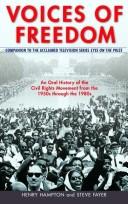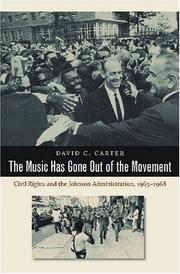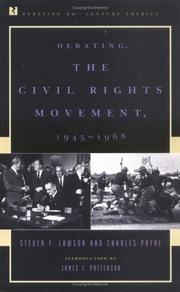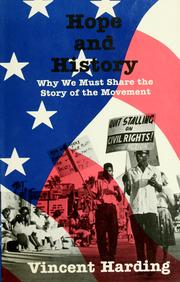| Listing 1 - 10 of 10 |
Sort by
|

ISBN: 1282060031 9786612060038 1433390744 9781433390746 Year: 2008 Publisher: Huntington Beach, CA Teacher Created Materials
Abstract | Keywords | Export | Availability | Bookmark
 Loading...
Loading...Choose an application
- Reference Manager
- EndNote
- RefWorks (Direct export to RefWorks)
Although slavery was illegal at the beginning of the twentieth century, segregation was prevalent, especially in the South. Through many uprisings, protests, and demonstrations, segregation was finally abolished and civil rights were established for people of varying colors, races, and genders. Today, we celebrate diversity in our nation because of the Civil Rights Movement of the twentieth century.
Book
ISBN: 9780415826129 9780415826143 9780203431863 9781135980689 9781135980757 0415826144 0203431863 0415826128 Year: 2016 Publisher: New York London Routledge
Abstract | Keywords | Export | Availability | Bookmark
 Loading...
Loading...Choose an application
- Reference Manager
- EndNote
- RefWorks (Direct export to RefWorks)
African Americans --- Civil rights movements --- Black power --- Civil rights --- History --- 20th century --- United States --- African Americans - Civil rights - History - 20th century --- Civil rights movements - United States - History - 20th century --- Black power - United States - History - 20th century
Book
ISBN: 0674065301 0674069560 9780674069565 9780674065307 9780674046870 0674046870 Year: 2012 Publisher: Cambridge, MA
Abstract | Keywords | Export | Availability | Bookmark
 Loading...
Loading...Choose an application
- Reference Manager
- EndNote
- RefWorks (Direct export to RefWorks)
Representing the Race tells the story of an enduring paradox of American race relations, through the prism of a collective biography of African American lawyers who worked in the era of segregation. Practicing the law and seeking justice for diverse clients, they confronted a tension between their racial identity as black men and women and their professional identity as lawyers. Both blacks and whites demanded that these attorneys stand apart from their racial community as members of the legal fraternity. Yet, at the same time, they were expected to be "authentic"-that is, in sympathy with the black masses. This conundrum, as Kenneth W. Mack shows, continues to reverberate through American politics today.Mack reorients what we thought we knew about famous figures such as Thurgood Marshall, who rose to prominence by convincing local blacks and prominent whites that he was-as nearly as possible-one of them. But he also introduces a little-known cast of characters to the American racial narrative. These include Loren Miller, the biracial Los Angeles lawyer who, after learning in college that he was black, became a Marxist critic of his fellow black attorneys and ultimately a leading civil rights advocate; and Pauli Murray, a black woman who seemed neither black nor white, neither man nor woman, who helped invent sex discrimination as a category of law. The stories of these lawyers pose the unsettling question: what, ultimately, does it mean to "represent" a minority group in the give-and-take of American law and politics?
African American lawyers --- Cause lawyers --- Civil rights movements --- Cause lawyering --- Lawyers --- Public interest law --- History --- Civil rights lawyers --- African American lawyers - Biography --- Civil rights lawyers - United States - Biography --- Civil rights movements - United States - History - 20th century --- Etats-Unis

ISBN: 0553057340 Year: 1990 Publisher: New York London Auckland Bantam Books
Abstract | Keywords | Export | Availability | Bookmark
 Loading...
Loading...Choose an application
- Reference Manager
- EndNote
- RefWorks (Direct export to RefWorks)
Oral history --- Afro-Americans - Civil rights - History - 20th century - Sources. --- Civil rights movements - United States - History - 20th century. --- United States - Race relations - Sources. --- Afro-Americans - History - 1877-1964 - Sources. --- Afro-Americans - History - 1964- - Sources. --- Oral history.

ISBN: 1469606577 0807832804 1469622009 9781469606576 9780807832806 9798890879615 Year: 2009 Publisher: Chapel Hill
Abstract | Keywords | Export | Availability | Bookmark
 Loading...
Loading...Choose an application
- Reference Manager
- EndNote
- RefWorks (Direct export to RefWorks)
After the passage of sweeping civil rights and voting rights legislation in 1964 and 1965, the civil rights movement stood poised to build on considerable momentum. In a famous speech at Howard University in 1965, President Lyndon B. Johnson declared that victory in the next battle for civil rights would be measured in ""equal results"" rather than equal rights and opportunities. It seemed that for a brief moment the White House and champions of racial equality shared the same objectives and priorities. Finding common ground proved elusive, however, in a climate of growing social and political
African Americans - Civil rights - History - 20th century. --- African Americans -- Civil rights -- History -- 20th century. --- Civil rights movements - United States - History - 20th century. --- Civil rights movements -- United States -- History -- 20th century. --- United States - Politics and government - 1963-1969. --- United States -- Politics and government -- 1963-1969. --- African Americans --- Civil rights movements --- Gender & Ethnic Studies --- Social Sciences --- Ethnic & Race Studies --- History --- Civil rights --- Afro-Americans --- Black Americans --- Colored people (United States) --- Negroes --- Civil liberation movements --- Liberation movements (Civil rights) --- Protest movements (Civil rights) --- Africans --- Ethnology --- Blacks --- Human rights movements --- Black people --- United States --- Politics and government

ISBN: 0847690539 0847690547 9780847690534 Year: 1998 Publisher: Lanham, Md. : Rowman & Littlefield,
Abstract | Keywords | Export | Availability | Bookmark
 Loading...
Loading...Choose an application
- Reference Manager
- EndNote
- RefWorks (Direct export to RefWorks)
African Americans --- Civil rights movements --- Noirs américains --- Ligues des droits de l'homme --- Civil rights --- Historiography --- History --- Sources --- Historiography. --- Sources. --- Droits --- Historiographie --- Histoire --- United States --- Etats-Unis --- Race relations --- Relations raciales --- African Americans - Civil rights - History - 20th century - Sources --- African Americans - Civil rights - Historiography --- Civil rights movements - United States - History - 20th century - Sources --- Civil rights movements - United States - Historiography --- United States - Race relations - Sources --- United States - Race relations - Historiography
Book
ISBN: 0773411062 9780773411067 Year: 2010 Publisher: Lewiston, N.Y. Edwin Mellen Press
Abstract | Keywords | Export | Availability | Bookmark
 Loading...
Loading...Choose an application
- Reference Manager
- EndNote
- RefWorks (Direct export to RefWorks)
This study examines the relation between political action and political oratory, with special attention to how these were experienced in the African American community. It focuses on three special cases; Kennedy, Johnson and Nixon.
African Americans -- Attitudes -- History -- 20th century. --- African Americans -- Civil rights -- History -- 20th century. --- Civil rights movements -- United States -- History -- 20th century. --- Presidents -- United States -- Inaugural addresses -- Social aspects -- History -- 20th century. --- African Americans --- Civil rights movements --- Presidents --- Gender & Ethnic Studies --- Social Sciences --- Ethnic & Race Studies --- Presidency --- Heads of state --- Executive power --- Afro-Americans --- Black Americans --- Colored people (United States) --- Negroes --- Africans --- Ethnology --- Blacks --- Attitudes --- History --- Civil rights --- Social aspects --- Inaugural addresses --- Black people
Book
ISBN: 9782021166217 202116621X Year: 2015 Publisher: Paris Seuil
Abstract | Keywords | Export | Availability | Bookmark
 Loading...
Loading...Choose an application
- Reference Manager
- EndNote
- RefWorks (Direct export to RefWorks)
Peu de figures universellement célébrées sont aussi mal connues que Martin Luther King Jr. La lutte pour les droits civiques et l’égalité des Noirs dont le pasteur baptiste prit la tête est remémorée comme un appel à la fraternité et à l’unité nationale que l’Amérique sut entendre. Ce récit édifiant a considérablement aseptisé la force révolutionnaire de sa pensée et la brutalité de l’oppression contre laquelle il s’insurgeait. Qui se souvient qu’à peine un an après avoir reçu le prix Nobel de la paix, King déclara que son rêve était devenu un cauchemar en raison de l’enracinement du système d’exploitation capitaliste ? La fin de la ségrégation institutionnelle en 1964 n’était à ses yeux qu’une étape. L’ultime phase de son combat, qui culmina avec la « Campagne des pauvres » et que son assassinat en 1968 laissa inachevée, fut quasiment effacée de la mémoire des États-Unis et avec elle le sens profond de son engagement. Penseur de la justice sociale, Martin Luther King opéra une extraordinaire synthèse entre christianisme, liturgie noire, non-violence, désobéissance civile et marxisme. C’est ce penseur avant-gardiste et radical à la postérité édulcorée que cet ouvrage entend faire redécouvrir en l’inscrivant dans une tradition de dissidence américaine trop souvent ignorée.
King, Martin Luther, --- Biography --- Civil rights movements --- African Americans --- Civil rights workers --- History --- Civil rights --- 929 KING, MARTIN LUTHER --- Biografie. Genealogie. Heraldiek--KING, MARTIN LUTHER --- Kiṅ, Mārṭṭin̲ Lūtar, --- 929 KING, MARTIN LUTHER Biografie. Genealogie. Heraldiek--KING, MARTIN LUTHER --- King, Martin Luther Jr. --- Biography. --- 960 --- 0 --- racisme --- Prix Nobel de la paix --- USA histoire --- levensbeschrijvingen --- biographies et mémoires --- Civil rights movements - United States - History - 20th century --- African Americans - Biography --- Civil rights workers - United States - Biography --- African Americans - Civil rights - History - 20th century --- King, Martin Luther, - Jr., - 1929-1968

ISBN: 0883446642 9780883446645 Year: 1990 Publisher: Maryknoll Orbis
Abstract | Keywords | Export | Availability | Bookmark
 Loading...
Loading...Choose an application
- Reference Manager
- EndNote
- RefWorks (Direct export to RefWorks)
Civil rights movements --- African Americans --- History --- Study and teaching. --- Civil rights. --- Civil rights --- Civil liberation movements --- Liberation movements (Civil rights) --- Protest movements (Civil rights) --- Human rights movements --- Afro-Americans --- Black Americans --- Colored people (United States) --- Negroes --- Africans --- Ethnology --- Blacks --- Civil rights&delete& --- Study and teaching --- History&delete& --- United States --- ABŞ --- ABSh --- Ameerika Ühendriigid --- America (Republic) --- Amerika Birlăshmish Shtatlary --- Amerika Birlăşmi Ştatları --- Amerika Birlăşmiş Ştatları --- Amerika ka Kelenyalen Jamanaw --- Amerika Qūrama Shtattary --- Amerika Qŭshma Shtatlari --- Amerika Qushma Shtattary --- Amerika (Republic) --- Amerikai Egyesült Államok --- Amerikanʹ Veĭtʹsėndi︠a︡vks Shtattnė --- Amerikări Pĕrleshu̇llĕ Shtatsem --- Amerikas Forenede Stater --- Amerikayi Miatsʻyal Nahangner --- Ameriketako Estatu Batuak --- Amirika Carékat --- AQSh --- Ar. ha-B. --- Arhab --- Artsot ha-Berit --- Artzois Ha'bris --- Bí-kok --- Ē.P.A. --- EE.UU. --- Egyesült Államok --- ĒPA --- Estados Unidos --- Estados Unidos da América do Norte --- Estados Unidos de América --- Estaos Xuníos --- Estaos Xuníos d'América --- Estatos Unitos --- Estatos Unitos d'America --- Estats Units d'Amèrica --- Ètats-Unis d'Amèrica --- États-Unis d'Amérique --- Fareyniḳṭe Shṭaṭn --- Feriene Steaten --- Feriene Steaten fan Amearika --- Forente stater --- FS --- Hēnomenai Politeiai Amerikēs --- Hēnōmenes Politeies tēs Amerikēs --- Hiwsisayin Amerikayi Miatsʻeal Tērutʻiwnkʻ --- Istadus Unidus --- Jungtinės Amerikos valstybės --- Mei guo --- Mei-kuo --- Meiguo --- Mî-koet --- Miatsʻyal Nahangner --- Miguk --- Na Stàitean Aonaichte --- NSA --- S.U.A. --- SAD --- Saharat ʻAmērikā --- SASht --- Severo-Amerikanskie Shtaty --- Severo-Amerikanskie Soedinennye Shtaty --- Si︠e︡vero-Amerikanskīe Soedinennye Shtaty --- Sjedinjene Američke Države --- Soedinennye Shtaty Ameriki --- Soedinennye Shtaty Severnoĭ Ameriki --- Soedinennye Shtaty Si︠e︡vernoĭ Ameriki --- Spojené obce severoamerické --- Spojené staty americké --- SShA --- Stadoù-Unanet Amerika --- Stáit Aontaithe Mheiriceá --- Stany Zjednoczone --- Stati Uniti --- Stati Uniti d'America --- Stâts Unîts --- Stâts Unîts di Americhe --- Steatyn Unnaneysit --- Steatyn Unnaneysit America --- SUA (Stati Uniti d'America) --- Sŭedineni amerikanski shtati --- Sŭedinenite shtati --- Tetã peteĩ reko Amérikagua --- U.S. --- U.S.A. --- United States of America --- Unol Daleithiau --- Unol Daleithiau America --- Unuiĝintaj Ŝtatoj de Ameriko --- US --- USA --- Usono --- Vaeinigte Staatn --- Vaeinigte Staatn vo Amerika --- Vereinigte Staaten --- Vereinigte Staaten von Amerika --- Verenigde State van Amerika --- Verenigde Staten --- VS --- VSA --- Wááshindoon Bikéyah Ałhidadiidzooígíí --- Wilāyāt al-Muttaḥidah --- Wilāyāt al-Muttaḥidah al-Amirīkīyah --- Wilāyāt al-Muttaḥidah al-Amrīkīyah --- Yhdysvallat --- Yunaeted Stet --- Yunaeted Stet blong Amerika --- ZDA --- Združene države Amerike --- Zʹi︠e︡dnani Derz︠h︡avy Ameryky --- Zjadnośone staty Ameriki --- Zluchanyi︠a︡ Shtaty Ameryki --- Zlucheni Derz︠h︡avy --- ZSA --- Η.Π.Α. --- Ηνωμένες Πολιτείες της Αμερικής --- Америка (Republic) --- Американь Вейтьсэндявкс Штаттнэ --- Америкӑри Пӗрлешӳллӗ Штатсем --- САЩ --- Съединените щати --- Злучаныя Штаты Амерыкі --- ولايات المتحدة --- ولايات المتّحدة الأمريكيّة --- ولايات المتحدة الامريكية --- 미국 --- Race relations. --- Race relations --- Race question --- Black people --- États-Unis --- É.-U. --- ÉU --- Civil rights movements - United States - History - 20th century. --- Civil rights movements - United States - History - 20th century - Study and teaching. --- African Americans - Civil rights. --- African Americans - Civil rights - Study and teaching.
Book
ISBN: 0804793484 9780804793483 0804792755 9780804792752 0804789428 9780804789424 9780804792752 9780804789424 Year: 2015 Publisher: Stanford, California
Abstract | Keywords | Export | Availability | Bookmark
 Loading...
Loading...Choose an application
- Reference Manager
- EndNote
- RefWorks (Direct export to RefWorks)
Well before Rev. Dr. Martin Luther King, Jr. spoke out against nuclear weapons, African Americans were protesting the Bomb. Historians have generally ignored African Americans when studying the anti-nuclear movement, yet they were some of the first citizens to protest Truman's decision to drop atomic bombs in Hiroshima and Nagasaki in 1945. Now for the first time, African Americans Against the Bomb tells the compelling story of those black activists who fought for nuclear disarmament by connecting the nuclear issue with the fight for racial equality. Intondi shows that from early on, blacks in America saw the use of atomic bombs as a racial issue, asking why such enormous resources were being spent building nuclear arms instead of being used to improve impoverished communities. Black activists' fears that race played a role in the decision to deploy atomic bombs only increased when the U.S. threatened to use nuclear weapons in Korea in the 1950's and Vietnam a decade later. For black leftists in Popular Front groups, the nuclear issue was connected to colonialism: the U.S. obtained uranium from the Belgian controlled Congo and the French tested their nuclear weapons in the Sahara. By expanding traditional research in the history of the nuclear disarmament movement to look at black liberals, clergy, artists, musicians, and civil rights leaders, Intondi reveals the links between the black freedom movement in America and issues of global peace. From Langston Hughes through Lorraine Hansberry to President Obama, African Americans Against the Bomb offers an eye-opening account of the continuous involvement of African Americans who recognized that the rise of nuclear weapons was a threat to the civil rights of all people.
African American political activists -- History -- 20th century. --- African Americans -- Politics and government -- 20th century. --- Anti-imperialist movements -- United States -- History -- 20th century. --- Antinuclear movement -- United States -- History -- 20th century. --- Civil rights movements -- United States -- History -- 20th century. --- HISTORY --- African American political activists --- African Americans --- Anti-imperialist movements --- Antinuclear movement --- Civil rights movements --- 20th Century. --- Politics and government --- United States --- Civil liberation movements --- Liberation movements (Civil rights) --- Protest movements (Civil rights) --- Human rights movements --- Anti-nuclear movement --- Antinuclear protest movement --- Nuclear freeze movement --- Protest movement, Antinuclear --- Social movements --- Nuclear disarmament --- Nuclear power plants --- Anti-colonialism --- Antiimperialist movements --- Imperialism --- National liberation movements --- Afro-American political activists --- Political activists, African American --- Political activists --- AB --- ABSh --- Ameerika Ühendriigid --- America (Republic) --- Amerika Birlăshmish Shtatlary --- Amerika Birlăşmi Ştatları --- Amerika Birlăşmiş Ştatları --- Amerika ka Kelenyalen Jamanaw --- Amerika Qūrama Shtattary --- Amerika Qŭshma Shtatlari --- Amerika Qushma Shtattary --- Amerika (Republic) --- Amerikai Egyesült Államok --- Amerikanʹ Veĭtʹsėndi͡avks Shtattn --- Amerikări Pĕrleshu̇llĕ Shtatsem --- Amerikas Forenede Stater --- Amerikayi Miatsʻyal Nahangner --- Ameriketako Estatu Batuak --- Amirika Carékat --- AQSh --- Ar. ha-B. --- Arhab --- Artsot ha-Berit --- Artzois Ha'bris --- Bí-kok --- Ē.P.A. --- EE.UU. --- Egyesült Államok --- ĒPA --- Estados Unidos --- Estados Unidos da América do Norte --- Estados Unidos de América --- Estaos Xuníos --- Estaos Xuníos d'América --- Estatos Unitos --- Estatos Unitos d'America --- Estats Units d'Amèrica --- Ètats-Unis d'Amèrica --- États-Unis d'Amérique --- Fareyniḳṭe Shṭaṭn --- Feriene Steaten --- Feriene Steaten fan Amearika --- Forente stater --- FS --- Hēnomenai Politeiai Amerikēs --- Hēnōmenes Politeies tēs Amerikēs --- Hiwsisayin Amerikayi Miatsʻeal Tērutʻiwnkʻ --- Istadus Unidus --- Jungtinės Amerikos valstybės --- Mei guo --- Mei-kuo --- Meiguo --- Mî-koet --- Miatsʻyal Nahangner --- Miguk --- Na Stàitean Aonaichte --- NSA --- S.U.A. --- SAD --- Saharat ʻAmērik --- SASht --- Severo-Amerikanskie Shtaty --- Severo-Amerikanskie Soedinennye Shtaty --- Si͡evero-Amerikanskīe Soedinennye Shtaty --- Sjedinjene Američke Države --- Soedinennye Shtaty Ameriki --- Soedinennye Shtaty Severnoĭ Ameriki --- Soedinennye Shtaty Si͡evernoĭ Ameriki --- Spojené obce severoamerick --- Spojené staty americk --- SShA --- Stadoù-Unanet Amerika --- Stáit Aontaithe Mheirice --- Stany Zjednoczone --- Stati Uniti --- Stati Uniti d'America --- Stâts Unîts --- Stâts Unîts di Americhe --- Steatyn Unnaneysit --- Steatyn Unnaneysit America --- SUA --- Sŭedineni amerikanski shtati --- Sŭedinenite shtati --- Tetã peteĩ reko Amérikagua --- U.S. --- U.S.A. --- United States of America --- Unol Daleithiau --- Unol Daleithiau America --- Unuiĝintaj Ŝtatoj de Ameriko --- US --- USA --- Usono --- Vaeinigte Staatn --- Vaeinigte Staatn vo Amerika --- Vereinigte Staaten --- Vereinigte Staaten von Amerika --- Verenigde State van Amerika --- Verenigde Staten --- VS --- VSA --- Wááshindoon Bikéyah Ałhidadiidzooígí --- Wilāyāt al-Muttaḥidah --- Wilāyāt al-Muttaḥidah al-Amirīkīyah --- Wilāyāt al-Muttaḥidah al-Amrīkīyah --- Yhdysvallat --- Yunaeted Stet --- Yunaeted Stet blong Amerika --- ZDA --- Združene države Amerike --- Zʹi͡ednani Derz͡havy Ameryky --- Zjadnośone staty Ameriki --- Zluchanyi͡a Shtaty Ameryki --- Zlucheni Derz͡havy --- ZSA --- ABŞ --- Amerikanʹ Veĭtʹsėndi͡avks Shtattnė --- É.-U. --- ÉU --- Saharat ʻAmērikā --- Spojené obce severoamerické --- Spojené staty americké --- Stáit Aontaithe Mheiriceá --- Wááshindoon Bikéyah Ałhidadiidzooígíí --- History
| Listing 1 - 10 of 10 |
Sort by
|

 Search
Search Feedback
Feedback About UniCat
About UniCat  Help
Help News
News